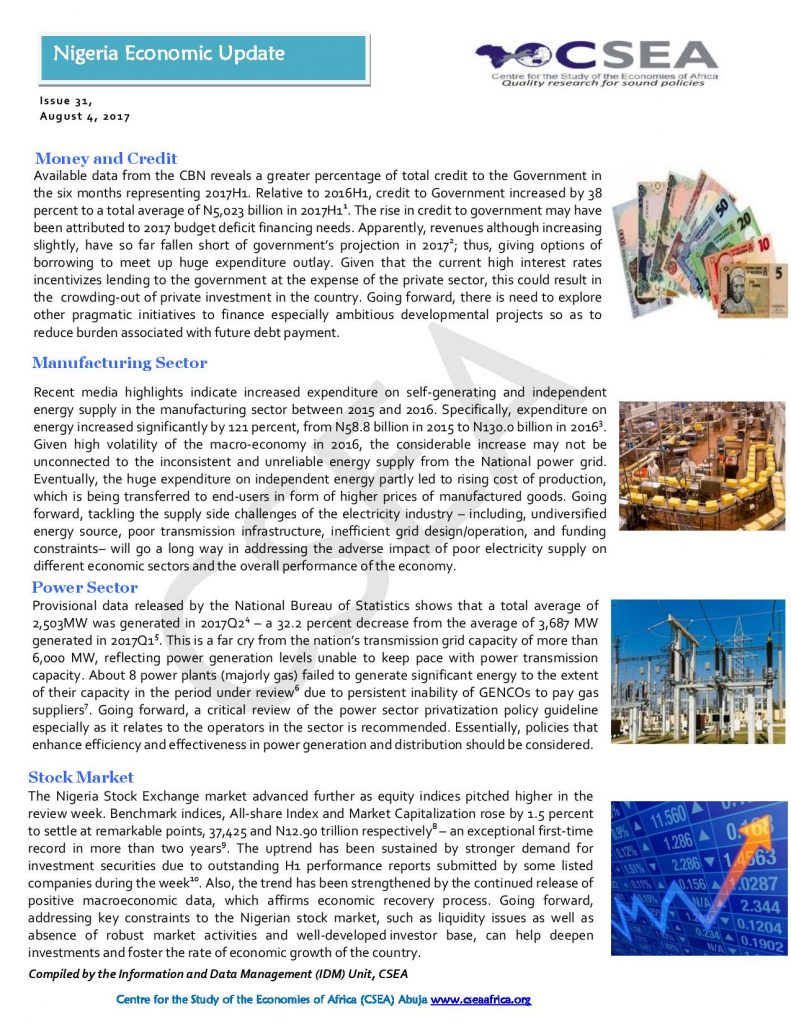Macroeconomic Report & Economic Updates

August 21, 2017
Nigeria Economic Update (Issue 31)
The Nigeria Stock Exchange market advanced further as equity indices pitched higher in the review week. Benchmark indices, All-share Index and Market Capitalization rose by 1.5 percent to settle at remarkable points, 37,425 and N12.90 trillion respectively an exceptional first-time record in more than two years. The uptrend has been sustained by stronger demand for investment securities due to outstanding H1 performance reports submitted by some listed companies during the week10.
Related
Nigeria Economic Update (Issue 48)
Crude
oil price decreased in the review week. OPEC weekly basket price reduced by 3.5
percent to $42.06per barrel from November 4, 2016 to November 11,
2016, while Nigerias bonny light price decreased by 1.1 percent to $44.36per barrel in the same period. Global oil market refocused on oversupply, as
indicated in the OPECs October crude data figures (global OPEC and Non-OPEC
oil supply grew by 0.97mb/day to average 96.32mb/day and outpaced demand by
1.92mb/day).
Nigeria-Poland Bilateral Trade: Identifying New Trade Opportunities
This paper examines the bilateral trade relationship between Nigeria andPoland for the period 1995 to 2012. It uses the Decision Support Model (DSM)and the Growth Identification and Facilitation Framework (GIFF) to identifymarket for Nigerian exports in Poland.
Nigeria Economic Update (Issue 37)
OPEC Monthly oil report reveals that Nigeria
recorded the highest month-on-month increase in crude oil production among the
OPEC member countries in August 2017. Specifically, at an increasing rate of 8
percent, domestic oil production rose to pre-2016 level of 1.86 million barrels
per day in August 2017. With ongoing repairs in the sector, oil
production could get to 2.2 million barrels per day in the near term, albeit
the prior voluntary agreement to cap production at 1.8 million barrels per day.
Going forward, there is need to address poor planning and policy
inconsistencies in the sector, in order to ensure the influx of investors who
have channeled their investments to other African countries due to laxity in
policies in the sector.
Nigeria Economic Update (Issue 43)
The IMF World Economic Outlook report, indicates a downward revision for Nigerias 2017 economic growth. Specifically, growth has been projected to expand by 0.6 percent relative to the 1.1 percent earlier projected. The decrease is attributable to sharp growth slowdown experienced in Nigeria, occasioned by prevailing constraining factors (crude oil production disruptions, Forex and power shortages, and weak investor confidence). The outlook, which does not seem optimistic, reveals Nigerias further vulnerability to potential external and internal risks/shocks.
